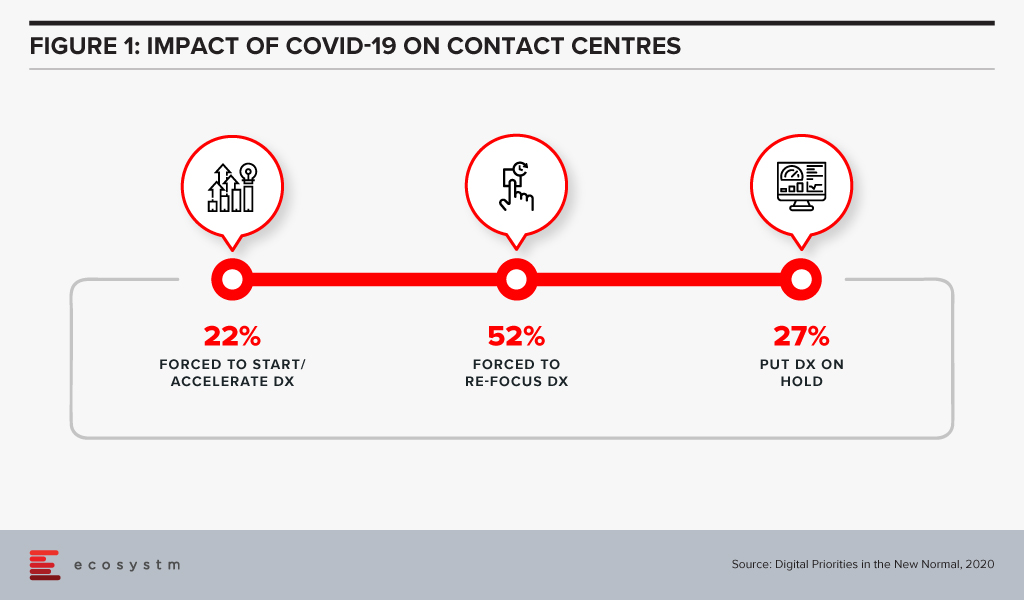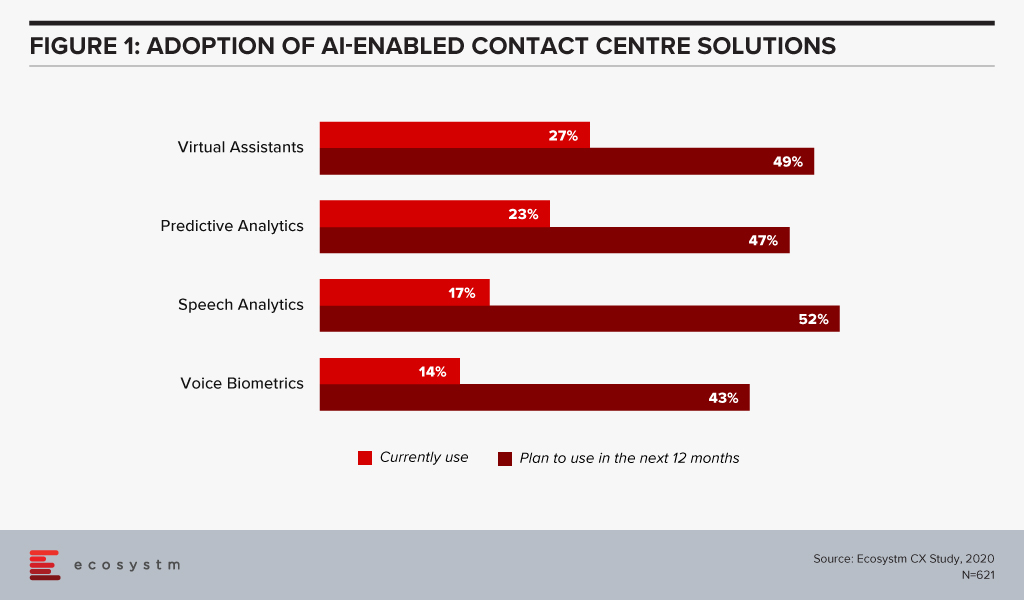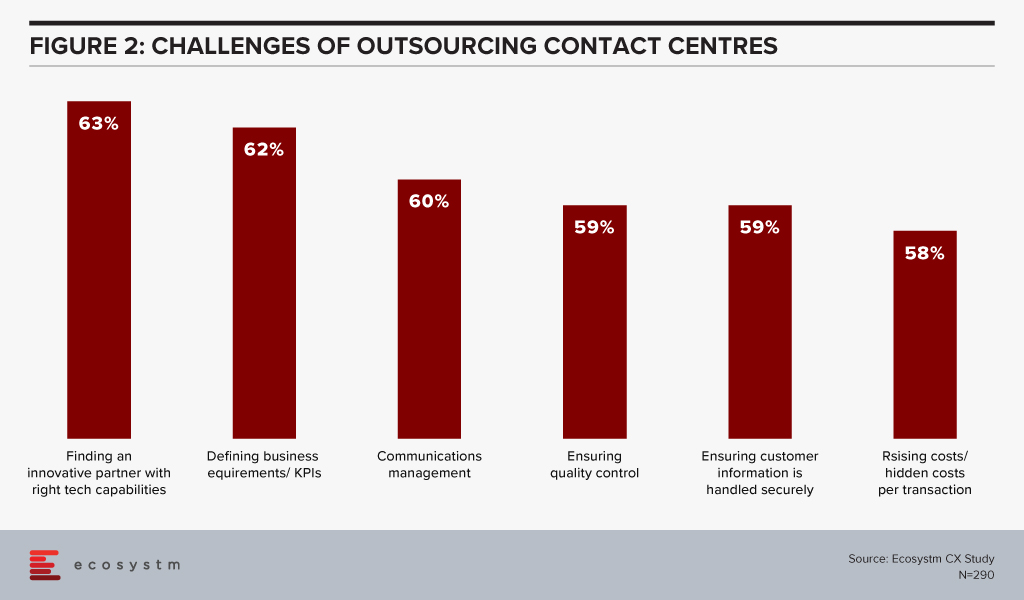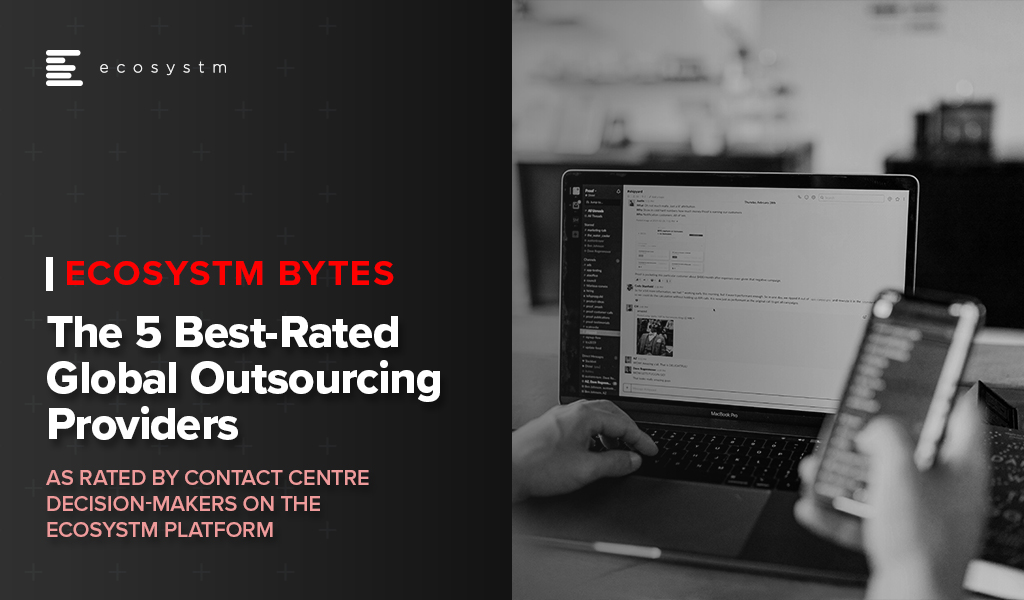In this Ecosystm Bytes, we bring to you the best rated global outsourcing providers based on the feedback from our platform users. Organisations are aware of the growing need to drive omnichannel experience and exceptional customer experience. In today’s competitive world that exceptional service that you provide might be the only key market differentiator.
If you are looking to outsource your business processes or your customer engagement, you should evaluate those organisations that are considered best-in-class and have expertise in your industry.
View the latest Ecosystm Bytes below, and reach out to our experts if you have questions.
2021 will see global outsourcing providers, dealing with new ways of working by employing various outsourcing capabilities. See how you can empower your teams and agents to deliver an exceptional experience in 2021 in our Ecosystm Predicts: The Top 5 Contact Centre Trends for 2021 report.

Running a contact centre has been extremely challenging in 2020. Contact centres have had to ensure business continuity, keep the focus on customer experience, and manage and motivate a largely remote workforce. Since the outbreak of COVID-19, not only have contact centres seen high inbound activity, but they have also had to manage agents who are dispersed and working remotely. 2020 has seen many contact centres starting, accelerating or re-focusing their digital transformation initiatives (Figure 1).

2021 will see contact centres focusing on transformation, not only to survive but also because their organisations and clients will expect more process efficiency and better customer experience. Ecosystm Advisors Audrey William and Ravi Bhogaraju present the top 5 Ecosystm predictions for Contact Centres Trends in 2021.
This is a summary of our predictions on the top 5 Contact Centre Trends for 2021 – the full report (including the implications) is available to download for free on the Ecosystm platform here.
The Top 5 Contact Centre Trends for 2021
- Remote Working Will Force Contact Centres to Re-evaluate Security Measures
Security has always been a concern for contact centre leaders. Improper data use by agents and agents breaching confidentiality are the biggest security challenges for contact centres. This has been further heightened, especially the fear of agents purposely breaching confidentiality while working from home.
Contact centres are still trying to figure out the best security measures when managing customer data, especially in the work-from-home environment. There is greater scrutiny over security and compliance measures – what agents view, how agents access the data, when agents log in and out of the system. Outsourcing providers will also have to guarantee high levels of security – a trusted relationship and defining the best practices on working from home will not be sufficient.
Many contact centres will trial different methods – from installing video surveillance cameras, desktop monitoring tools and access controls. Others will test technologies that can mask the information captured through mobile devices. This presents immense opportunities for vendors, as contact centres will rely heavily on technology to re-invent their security practices.
- Contact Centres will Invest in Conversational AI – Chatbots will No Longer be Enough
Many enterprises have rushed into deploying chatbots with expectations that these engines can solve the problem of high call volumes. The outcomes have often been poor, leaving customers frustrated and opting to interact with a live agent instead. Implementing a basic chatbot does not fully solve the problem and will force companies back to the drawing board.
Conversational AI offers a different experience by designing multiple forms of dialogues and conversations. It requires conversational design and the algorithms go through rigour from the start. The aim should be to make the channel irresistible – one that customers have confidence in, and that can reduce the need to email or call an agent. Successful uses cases have shown that conversational AI can reduce calls and repetitive queries by 70-90%. Ecosystm research finds that contact centres are ramping up their self-service capabilities and their adoption of AI and machine learning.
- Offshore Centres will Re-invent Themselves and Make a Comeback
2020 has seen contact centres in offshore locations struggle to offer services to global clients. Many of these operators have been plagued by poor internet connectivity at agents’ homes, and unfavourable home working environments. These outsourcing locations remain vital however, for multiple reasons – for example the range of services offered, agent specialisation, costs or diversity in agent profile.
Contact centre outsourcing providers will make a comeback in 2021 and we can expect new models to appear. Many providers across the globe have been running successful work-from-home only operations for years – other outsourcing providers will learn from these best practices. Organisations will find that bringing jobs back to high-cost locations will incur more costs. A full onshore model may not be the right model for business continuity, and organisations will prefer to have back-up locations to ensure continuity of services if another pandemic or catastrophe happens. Organisations will want to see the outsourcing providers offer them a choice of location – they will prefer some services to be delivered from offshore locations and others to remain onshore.
- Digital and Mobile will be the Cornerstone of Deeper Customer Engagement
COVID-19 has changed how customers want to be served, and organisations have had to re-evaluate how they use their channels – e.g. email, web, chat and voice. Customer profiles and expectations have changed over the year and they are more digital savvy and are more likely to interact with brands through digital and mobile apps. They will expect a single point of interaction – for their enquiries and to complete their transactions. For instance, they will expect to chat while filling up shopping carts. Introducing chat capabilities within mobile apps is a good way to impress customers – this can be an effective way to push promotions and upsell. Capabilities such as the ability to directly place a call from a website will make the customer experience exceptional. Customers will expect to move between channels easily when interacting with a brand.
- Workplace Collaboration Will be Fully Integrated into Contact Centres
Contact centres will reassess their business and talent models. The focus on employees will be in two major areas:
- Productivity. The contact centre floor dynamics have changed in how agents are spread out across outsourcing locations and in-house contact centres. Agents are no longer located in the same room or floor and do not have access to their usual way of work – continual training, digital signage that provides guidance and demonstrates KPIs, conversations with supervisors, managers, and team members for guidance or assistance, easy access to back-office functions and so on. This can impact their productivity.
- Engagement. Contact centre staff often work in high-stress environments -chasing sales targets and deadlines, handling complaints – and it is important for managers and supervisors to be able to engage and motivate them constantly. Remote working has further exacerbated the stress for those agents who do not have a conducive working environment at home.
Contact centres will increasingly look to workplace collaboration platforms and tools to improve employee productivity and experience.

Probe Group, a Business Process Outsourcing (BPO) solutions provider and Stellar – a customer experience (CX) management organisation announced a merger to create Australia’s largest and most diverse CX provider group. The partnership will combine the experience and expertise of both companies and will employ 12,600 people to provide outsourcing of business process services for customers across six countries. Probe Group is backed by Quadrant Private Equity and Five V Capital.
Probe Group has been expanding its business presence since being acquired by Five V Capital in early 2018. At the time, Probe acquired Salmat’s Contact business, a broad-based CX operation which helped Probe expand their presence in Australia, New Zealand and the Philippines. Looking out for further opportunities, in December last year Probe Group acquired Australia-based and Philippines-focused Beepo and quickly followed this with an acquisition in January this year of the Philippines outsourcing agency MicroSourcing, a counterpart to Beepo which greatly expanded Probe’s Philippines offering. These acquisitions helped Probe extend their service offering from CX into Shared Services and Knowledge Services.
This is a brilliant move as Stellar is one of the most successful contact centre outsourcing providers in Australia. With successive growth for 22 years and having a strong footprint in both the public and private sectors, the acquisition will give Probe Group entry into some large accounts. Additionally, Probe will gain a large pool of well-trained agents in Australia and other locations across the globe.
The merger comes at an interesting time when we are seeing several organisations re-evaluate their outsourcing strategy. There is also an active interest in enhancing CX through AI/automation. Both the Probe Group and Stellar understand the Australian market and consumer sentiments and the merger is expected to drive better customer outcomes in the Australia market.
Prior to COVID-19, Probe Group employed 8,500 agents. With this acquisition, they will have 12,600 agents and an expected turnover of USD 420 million. That is not only impressive but will help Probe offer a variety of services including both onshore and offshore, to take on their rivals.
Rise of Onshore Activity will see New Shifts in CX Delivery Models
The COVID-19 pandemic has brought about several changes to the outsourcing sector. The disruption caused by services in many key offshore markets led to organisations re-evaluating their contact centre outsourcing strategy and some have started moving contact centre jobs back to Australia. Westpac is the latest organisation to announce that they are moving 1,000 jobs back to Australia. They have stated that while they expect productivity benefits over time, there is clearly a cost to adding 1,000 roles – likely an uplift of around $45 million per annum in its costs by the end of 2021.
The cost element is bound to creep in over time and contact centres will ask outsourcing providers to help drive costs down. Options would include moving some services offshore, while the critical remain onshore. Striking that balance to manage costs will be important and so will be the ability to offer various options for customers. Additionally, we can expect to see an increased demand for self-service technologies. Many organisations are in the midst of re-evaluating the use of AI and automation technologies not only as a way to drive great CX but as a way to also reduce costs (Figure 1).
Contact centres are starting to realise that to modernise their contact centre, the ability to lead with machine learning and AI technologies are critical. It will drive the deployment of natural language understanding (NLU) and conversational AI, sentiment analysis, transcription capabilities – and ultimately provide intelligence about the call even prior to the call being fielded. However, it is worth noting that whilst automation is on the rise, the role of the agent is not going away anytime soon and will grow in importance. We will see the rise of the “super-agent’’ and the agent’s role will evolve over time and AI/automation will generate rich insights to help aid the agent and the contact centre team to better predict customer behaviour and patterns.
The Next Generation of Outsourcing Providers must Drive Innovation for their Customers
Companies today are not outsourcing just to save labour costs. While cost remains an important angle, it will not often be the main driver for outsourcing in the future. The next generation of outsourcing providers will have to build rich solution capabilities, customer journey maps and help customers understand how to align all channels. This involves working with many different technology providers to build the right capabilities for their client organisations. Organisations are keen to modernise their contact centre operations to achieve excellence in CX. Outsourcing providers must have the capability to deliver that innovation.
Ecosystm research finds that 63% of organisations that outsource their contact centre functions are challenged with finding the right partner that can drive innovations (Figure 2).
Contact centre outsourcing providers have a role to play in some of the following areas:
- The ability to adapt to change and take on risks together with the client
- Ensuring that all forms of security and governance measures are in place. This includes considering factors such as data security, data handling, and security features enabled across devices, applications, and the network. This is especially true for Government and Financial services contracts. Additionally, with some organisations preferring the work from a home model, there are security issues that must be addressed for the scenario.
- Helping the move from a traditional contact centre to a contact centre that delivers the highest levels of CX for its customers. Applying technologies such as AI and machine learning, NLU, biometrics, speech analytics, customer journey analytics and robotic process automation (RPA) will be key to modernisation.
- Being able to build a business continuity plan (BCP) for their customers in the event of another crisis.
Ecosystm Comment
Probe Group started off as a business specialising in outsourcing services in the credit and collections segment. Their customers in 2016 ranged from organisations across Financial Services, Utilities, and Federal and State Government. At that time, Probe employed about 300 people and their turnover was about USD 25 million. They did not rest on their laurels and realised that organic growth combined with strategic acquisitions would give them a foothold across various geographies and add new capabilities to their portfolio. With the rise in onshore activity, they will now be in a strong position to offer their customers various services and models of engagement to help drive CX excellence. The acquisition of Stellar will help Probe Group propel to greater heights and we see a new CX outsourcing giant being born.

As a technology analyst I have followed HCL for many years – and their capabilities have changed over that time – particularly in Australia and New Zealand. When they entered the ANZ market they were somewhat unique – an Indian IT Service provider with views and opinions. One who was not just good at meeting RFP requirements and delivering technology projects, but also individuals who were empowered to challenge the status quo in their clients – to challenge clients to be better. But as several large managed services providers lost their way in ANZ, HCL stepped in and – for a number of years – became all about outsourcing and managed services. They grew their business significantly, but what seemed to be lost was that factor that set them apart. In focusing on good delivery they seemed to lose their differentiator.
However, I recently spent a few days with HCL and their clients in Adelaide and I can report that they are back. They are winning digital transformation deals. They are driving a technology industry agenda and are becoming an important force in the education and evolution of the high tech sector in Australia and New Zealand. Adelaide was chosen for the event as HCL wanted to showcase how they are making real investments in the local market, and how they are helping South Australia to transform itself and create new job opportunities both in Adelaide and in the regions. Their managed services contract with Elders is a great starting point for them – and in meeting and interviewing the Elders stakeholders, it is clear that it is a partnership – HCL has collocated to ensure that the HCL staff are side-by-side with the Elders teams – and they are doing a good job in driving innovation into the Elders business.
The Cricket Australia digital transformation contract is a big deal, and is really a great indicator of their capabilities. HCL won the contract from Accenture – showing that they can compete against and beat the best (Accenture is the biggest IT services provider in Australia today – and for good reason). Building off their success with Manchester United, HCL has won another important digital transformation deal with a global sporting brand. Personally, as a fan of the Australian women’s and men’s cricket team, I look forward to engaging with the fruits of their endeavours soon!
The main take away from the time spent with HCL is that they are growing their business here in Australia and across the entire Asia Pacific region – and that the growth is coming from many areas – not just traditional outsourcing contracts but also across the spectrum of digital transformation. Importantly they are also taking responsibility for that growth – bringing the market along with them as they look to help educate and employ the next generation of technology professionals.
HCL also seem to have mastered the ability to both respond to the standardised processes of the sourcing deal advisors as well as stand out as an individual company. While deal advisors play an important role, I often hear clients say that they can sometimes take the personality out of a deal. They bring comparisons between vendors to standard and measurable metrics – but you sign a deal with a person, you negotiate with a person, and it is people who deliver the solution. Winning deals is not just about proving the ability to deliver, but also convincing the client that they want or need to partner with the IT services business. Based on client feedback, HCL is mastering both sides of this process, and are earning the right to be considered in a broader range of deals.
If you are dealing with HCL, it may also warrant looking beyond the traditional measurable metrics. Speak to their leadership team both locally and globally, especially given their emphasis to bring in local leadership in their key markets . Get a feel for the culture of the company and whether or not it matches your culture or even sometimes challenges your business to be better. Services deals are ultimately about people, so spend time with the people – challenge them to come to the party. Put them under stress and see how they respond, as it is typically the hard times that define the longer term success of a partnership.














